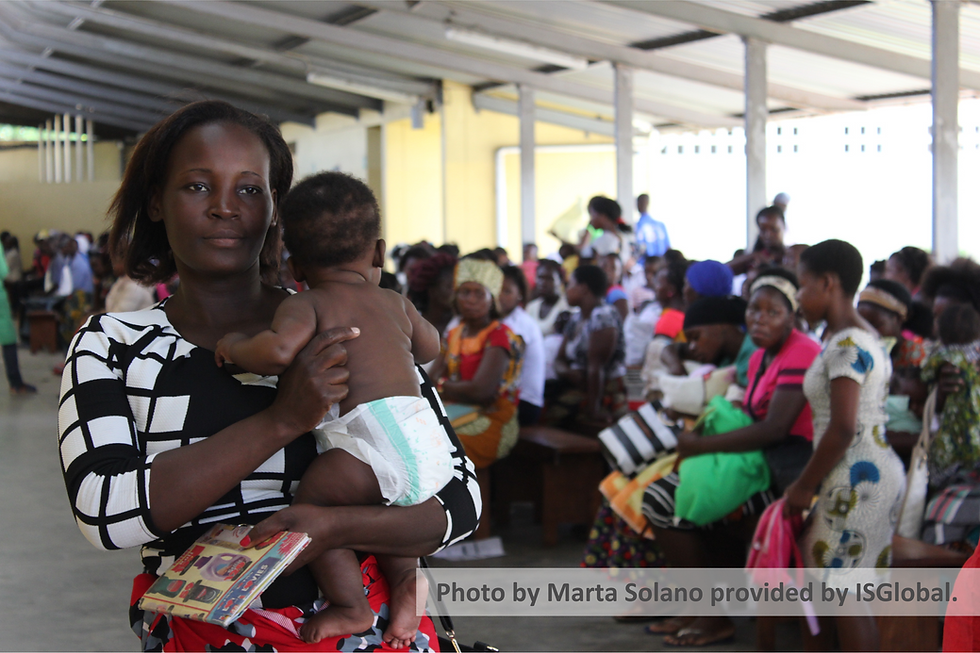THE PNEUMOCOCCAL VACCINE PROVIDES INDIRECT PROTECTION TO UNVACCINATED NEWBORNS
- Wanderleia Iris Noa
- May 2
- 3 min read

A prospective study in Mozambique highlights the impact of childhood immunization on reducing the incidence and mortality of invasive pneumococcal disease in infants who have not yet been vaccinated.
The pneumococcal conjugate vaccine PCV10 provides indirect protection to children who are too young to be vaccinated, according to a study conducted by the Barcelona Institute for Global Health (ISGlobal), a centre supported by the ”la Caixa” Foundation, in collaboration with the Manhiça Health Research Centre (CISM), Mozambique. The findings, published in The Pediatric Infectious Disease Journal, come from the pneumonia and demographic surveillance systems carried out by the CISM at the Manhiça District Hospital in Southern Mozambique.
Pneumococcus (Streptococcus pneumoniae) is a leading cause of meningitis, sepsis, and childhood pneumonia, especially in low- and middle-income countries. Since 2000, the vaccine against this bacterium has been included in global routine immunization programmes. In April 2013, Mozambique introduced PCV10, which protects against ten pneumococcal serotypes. This reduced cases of invasive pneumococcal disease and severe pneumonia in children under five years old, but the effects on those too young to be vaccinated — children under 10 weeks of age — had not been studied.
“We studied the burden of invasive pneumococcal disease and severe clinical pneumonia in young children in Southern Mozambique before and after the introduction of the PCV10 vaccine,” explains Sérgio Massora, first author of the study and a researcher at the CISM. “To do this, we included in the study all babies under ten weeks old who were diagnosed with one of these diseases at the Manhiça District Hospital between 2003 and 2018,” he adds.
The diagnosis of invasive pneumococcal disease is confirmed by the identification of pneumococcus in blood or cerebrospinal fluid using molecular tests (PCR) or cultures. Severe clinical pneumonia, however, is diagnosed clinically based on signs such as respiratory distress, among others.
Benefits extend beyond vaccinated individuals
The research team found that, five years after the introduction of PCV10 into Mozambique's immunization program, cases of invasive pneumococcal disease and severe clinical pneumonia in unvaccinated infants fell by 87% and 62%, respectively. There was also a reduction in mortality related to these infections, with deaths from invasive pneumococcal disease falling from 47 to 0 per 100,000 infants at risk.
This means that children who have not yet reached the minimum age for vaccination can benefit from herd immunity. “Our results suggest that childhood vaccination protects not only vaccinated children, but also newborns in their first weeks of life, by reducing the circulation of the bacterium in the community,” explains Azucena Bardají, medical doctor and senior researcher at ISGlobal and lead author of the study.
An ongoing challenge
It is important to consider that other factors — such as the decline in HIV-related childhood infections and socioeconomic improvements in the country — may have contributed to the reduction in pneumonia incidence. The researchers emphasise the need of continuing to evaluate the long-term impact of the vaccine: “It is imperative to ensure that PCV vaccination programmes continue to defeat preventable deaths among infants in countries with limited resources,” concludes Bardají.
Reference
Massora S, Mucavele H, Carvalho MDG, Mandomando I, Chaúque A, Moiane B, Tembe N, Omer SB, Bassat Q, Verani JR, Menéndez C, Quintó L, Sigaúque B, Bardají A. Effect of the Ten-valent Pneumococcal Conjugate Vaccine on Invasive Pneumococcal Disease and Pneumonia in Infants Younger Than Ten Weeks of Age in Southern Mozambique: A Population-based Prospective Surveillance Study. Pediatr Infect Dis J. 2025 Feb 1;44(2S):S75-S79. doi: 10.1097/INF.0000000000004638. Epub 2025 Feb 14. PMID: 39951078.









Comments